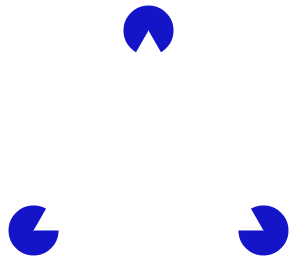 One important process used in perceptual interpolation is edge completion. Edge completion is the
perception of a physically absent but inferred edge, allowing us complete perception of a
partially hidden object. A stunning example of edge completion comes from illusory
contours, as illustrated by the famous Kanizsa triangle (see Kanizsa, 1979; Petry & Meyer, 1987).
Kanizsa developed these illusions explicitly working in the tradition of Gestalt psychology, and
you can apply many of the principles of Gestalt psychology to interpret or predict the presence of
illusory contours. Illusory contours (or subjective contours) are perceptual edges that exist
because of edge completion but are not actually physically present. In the figure below, we see a
bright white triangle, imposed on a background of blue circles. However, look closer there is
no real difference in brightness between the white of the triangle and the white of the background.
In fact, if you can force yourself to see three blue Pac-Man figures rather than three occluded
triangles, the illusion of the bright triangle may disappear.
One important process used in perceptual interpolation is edge completion. Edge completion is the
perception of a physically absent but inferred edge, allowing us complete perception of a
partially hidden object. A stunning example of edge completion comes from illusory
contours, as illustrated by the famous Kanizsa triangle (see Kanizsa, 1979; Petry & Meyer, 1987).
Kanizsa developed these illusions explicitly working in the tradition of Gestalt psychology, and
you can apply many of the principles of Gestalt psychology to interpret or predict the presence of
illusory contours. Illusory contours (or subjective contours) are perceptual edges that exist
because of edge completion but are not actually physically present. In the figure below, we see a
bright white triangle, imposed on a background of blue circles. However, look closer there is
no real difference in brightness between the white of the triangle and the white of the background.
In fact, if you can force yourself to see three blue Pac-Man figures rather than three occluded
triangles, the illusion of the bright triangle may disappear.
Use this activity to explore the Kanizsa triangle and some of the factors that increase or decrease our perception of illusory contours.
To see the illustration in full screen, which is recommended, press the Full Screen button, which appears at the top of the page.
Below is a list of the ways that you can alter the illustration. The settings include the following:
Figure Size: adjust the size of illusory triangle.
Show Corners: are the Pac-Man figures visible at the corners?
Corner Size: adjust the size of the corner Pac-Man figures, if corners are visible.
Show Lines: add lines that "go behind" the illusory triangle.
Number of Lines: increase or decrease the number of lines, when lines are visible.
Transparent Figure: have the lines look like they are coming through
a partially transparent illusory figure. (Can check this option only when lines are present.)
Curved Figure: make the illusory triangle have curved sides.
Adjust Curve: adjust the direction and degree of curve on the triangle,
if a curved figure has been selected.
Pressing this button restores the settings to their default values.